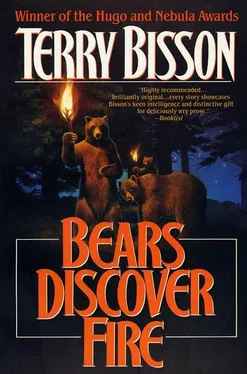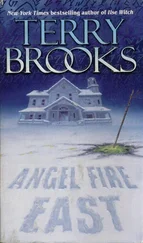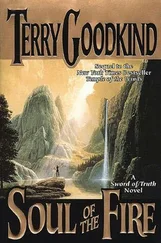“Sounds like cereal when you pour the milk on!” said one of the kids.
Carl knelt down and pulled up a clump of grass and smelled the roots; then he sniffed the air and looked over at me as if for the first time. “Code Ten,” he said in a curiously flat voice. Hadn’t we both known this day had to come?
“Look out!” one of the neighbors shouted. “Get back!”
The brown at the edges of the yard was starting to darken and spread inward. The crackling grew louder as it closed on the still-green center; it pulled back once, then again, each wave leaving the yellow-green grass a little paler. Then the grass all darkened at once like an eye closing, and there was silence. I felt my knees give out, so I leaned back against the truck.
“It’s not too late, is it, Carl?” asked Mr. Barber, coming to the end of the walk. His wife followed him, sniffling with fear, keeping her feet on the center of the walk, away from the dead ground. The thin dying smell had given way to a foul, wet, loathsome ugly stench as if some great grave had yawned open.
“What’s that smell?” a neighbor asked.
“Hey, mister, your boy is falling over,” said one of the kids, tugging at Carl’s sleeve. “His hat came off.”
“She’s not a boy,” said Carl. “And her name is Gaea.” I’d never heard him get it right before.
“What’s that smell?” asked another neighbor. She was sniffing not the lawn but the wind, the long one, the one that blows all the way around the world.
“Excuse me,” Carl said to the Barbers. He ran over and tried to pick me up, but I was too far gone.
“It is too late, isn’t it, Carl?” said Mr. Barber, and Carl, nodding, began to cry, and so would I if I could have anymore.
The voice on the phone was distinct if faint: “Our call came through.”
“I’ll be right there.”
Although I had wanted this for years, had anticipated it, had worked for it and dreamed of it even when working for other things, it was still hard to believe. And harder still to explain to Janet.
“That was Beth on the phone,” I said.
“And you’re leaving.” It was a statement, not a question.
“We both knew this might happen.”
“Don’t bother coming back.”
“Janet…”
But she had already rolled over and was pretending to be asleep. I could almost hear the fabric ripping: the seam of an eight-year marriage that had held us together from small colleges in the Midwest to oceanic exploration centers, to the long winters at Woods Hole.
Once it started to tear, it tore straight and true. I took a cab to the airport.
The flight to San Diego was interminable. As soon as I got off the plane I called Doug at Flying Fish.
“Remember when you said you would drop everything to take me to the island if what we were trying to do came through?”
“I’ll meet you at the hangar,” he said.
Doug’s ancient Cessna was already warming up when I got there. I carried two coffees, the black one for him. We were in the air and heading west over Point Loma before we spoke.
“So the fish finally got through,” he said.
“Dolphins aren’t fish and you know it,” I said.
“I wasn’t talking about them; I was talking about Leonard. He spends so much time underwater he ought to grow gills.”
Doug flew out to the island twice a month to deliver supplies to my partners. As the mainland diminished to a smudge behind us, I thought of the years of research that had brought us to this remote Pacific outpost.
Our funding had been cut off by the Navy when we had refused to allow them to use our data for weapons research. It had been cut off by Stanford when we had refused to publish our preliminary results. Grant after grant had fallen away like leaves; like my marriage, which I now could see was only another leaf hitting the ground. Janet and I had been going in different directions for several years, ever since I had turned down tenure in order to continue my life’s work.
The Project.
“There it is, Doc.”
The island had been loaned to us by Alejandro Martinez, the nitrate millionaire who was even now on his deathbed in Mexico City. It was a mile-long teardrop of rock, inhabited at one end by seals and at the other by the gray (dolphin-colored, I realized for the first time) fiberglass modulars of the Project.
Doug brought the little 172 straight in to the short strip bulldozed out of the side of a hill. I wondered how he managed in a fog or a wind. There were only about ten feet left at the end, when he snubbed the brakes hard to keep the prop out of the rocks.
Beth was waiting in the jeep with the engine running. Seeing the radiant smile on her broad, plain face, I wondered what my life would have been like if I had married not for beauty but for harmony. She and Leonard were partners before anything else.
“Welcome!” she shouted over the wind and crashing surf. “Want to join us, Doug? This is our big day!”
“Wouldn’t miss it for the world,” he said, shutting down the engine. “Where’s the fish?”
“Down in the pool, I imagine,” Beth said. “Comes and goes. What kind of intelligent creature would communicate with us if we kept it confined?”
“He’s pulling your leg,” I told her. “He’s talking about Leonard.”
“So am I,” she laughed.
Expertly, terrifyingly (“This is Mexico, after all!”), Beth raced down the island’s only half mile of road to the lab, which was built out over the rocks. It looked like a gray and pink coral shelf left behind by the tide. The pool it enclosed was open on three sides to the sea.
Leonard was on the sheltered upper deck, dripping in the wet suit he always wore, munching a seaweed sandwich and staring at a computer screen.
“It came?” I asked.
“The message. It came,” he said, looking up at me, his face shining with either sea water or tears.
We embraced, and Beth joined us both. It was a shared triumph. Leonard and I had started the Project twelve years before. He had done the undersea field work, she had designed and built the voice synthesizer, and I had written the program.
While I got into my wet suit, Beth explained to a puzzled Doug what we had done. It had all been top secret until now.
“The previous attempts to communicate with dolphins always failed because of the time factor,” she said. “It was Doc who figured out that they think not as individuals but collectively. The first problem was to convince them that we, a race that lives and dies as individuals, is even capable of thought, much less communication. Their feeling was, I think, that all our activity was reactive behavior.”
“What about cities? Ships?” said Doug. “We’ve been active on the sea for centuries.”
“Oh, they know that. But they have seen coral reefs and seashells, all built objects. The Australian Barrier Reef, for example, is a made object, and it’s vaster than all our cities put together. They don’t make things. They don’t put value in things.”
“The work of their civilization is thought,” put in Leonard. “They are building a thought, a concept that they have been working out over the millennia. It’s a grand project beyond anything we could imagine.”
“So they think they’re too good to talk to us,” said Doug.
“Don’t get your fur up,” said Beth, laughing. “They don’t think in words, like we do. Words are an extension of the hand—a grasping mechanism, and they don’t grasp and manipulate ideas in the way we do. So what we’ve been working to do over the years is to try and break their concepts down into words.”
I was almost ready. I had another gulp of coffee. My hand was shaking.
Читать дальше












